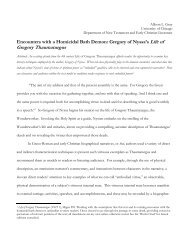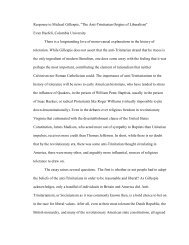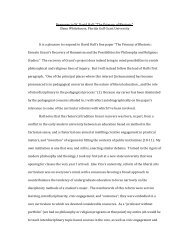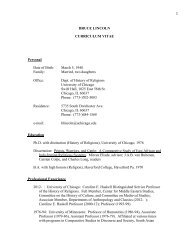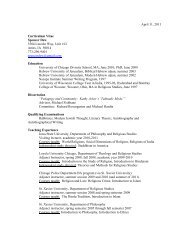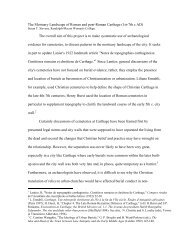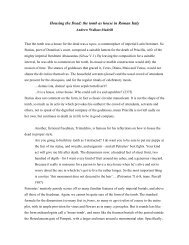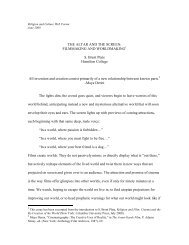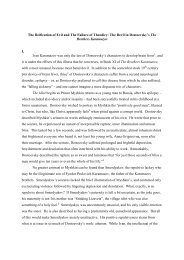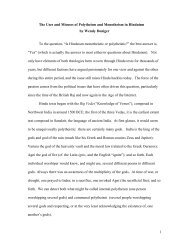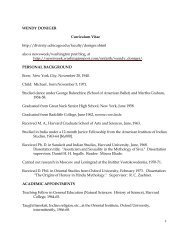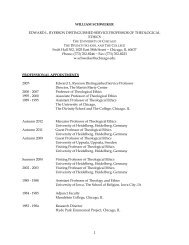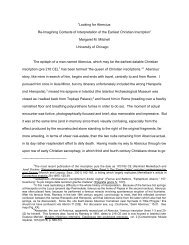*Criterion Winter 02-4.16 - Divinity School - University of Chicago
*Criterion Winter 02-4.16 - Divinity School - University of Chicago
*Criterion Winter 02-4.16 - Divinity School - University of Chicago
Create successful ePaper yourself
Turn your PDF publications into a flip-book with our unique Google optimized e-Paper software.
6 W INTER 20<strong>02</strong><br />
. . . real faith comes from God, and not from the unaided human faculties<br />
which [Pascal] argues are deceptive and inadequate for the task . . .<br />
That is why those to whom God has given religious<br />
faith by moving their hearts are very fortunate, and feel<br />
quite legitimately convinced, but to those who do not<br />
have it we can only give such faith through reasoning,<br />
until God gives it by moving their heart, without which<br />
faith is only human and useless for salvation. (110)<br />
Or, as he eloquently summarizes it in two consecutive passages:<br />
The heart has its reasons <strong>of</strong> which reason knows<br />
nothing: we know this in countless ways. (423)<br />
It is the heart which perceives God and not the reason.<br />
That is what faith is: God perceived by the heart,<br />
not by the reason. (424)<br />
In this way, real faith comes from God, and not from the<br />
unaided human faculties which he argues are deceptive and<br />
inadequate for the task:<br />
Faith is different from pro<strong>of</strong>. One is human and the<br />
other a gift <strong>of</strong> God. The just shall live by faith. This is<br />
the faith that God himself puts into our hearts, <strong>of</strong>ten<br />
using pro<strong>of</strong> as the instrument. Faith cometh by hearing.<br />
But this faith is in our hearts, and makes us say<br />
not ‘I know’ but ‘I believe.’ (7)<br />
Faith is a gift <strong>of</strong> God. Do not imagine that we describe<br />
it as a gift <strong>of</strong> reason. Other religions do not say that<br />
about their faith. They <strong>of</strong>fered nothing but reason as<br />
a way to faith, and yet it does not lead there. (588)<br />
Pascal’s position here, that faith comes from God and not<br />
from reason, is by itself not altogether surprising. While it<br />
is certainly not universally agreed upon, it can be found in<br />
a number <strong>of</strong> other thinkers. This does, <strong>of</strong> course, raise an<br />
interesting problem for someone, like Pascal, attempting to<br />
convince another person to become a Christian: if rational<br />
argument and experience are powerless to convince someone<br />
to become a Christian, then by what means can one<br />
move the libertine in that direction? Here is where Pascal’s<br />
famous wager argument enters. While this is a fascinating<br />
topic, it is not mine this afternoon. Instead I would like to<br />
focus on another aspect <strong>of</strong> his religious epistemology.<br />
It is interesting to see how Pascal maneuvers the libertine<br />
into the position where God moves his heart and he acquires<br />
real faith. But it is also interesting to consider what happens<br />
after the heart is moved. It is important to understand that<br />
Pascal is not a straightforward fideist: he does not think that<br />
belief is simply a matter <strong>of</strong> receiving God’s gift. After our<br />
hearts are moved, the story continues. Speaking in the<br />
voice <strong>of</strong> God, Pascal writes:<br />
‘I do not demand <strong>of</strong> you blind faith.’<br />
‘I do not mean you to believe me submissively and<br />
without reason; I do not claim to subdue you by<br />
tyranny. Nor do I claim to account to you for everything.<br />
To reconcile these contradictions I mean to<br />
show you clearly, by convincing pro<strong>of</strong>s, marks <strong>of</strong><br />
divinity within me which will convince you <strong>of</strong> what<br />
I am, and establish my authority by miracles and<br />
pro<strong>of</strong>s that you cannot reject, so that you will then<br />
believe the things I teach, finding no reason to reject<br />
them except for the fact that you cannot by yourselves<br />
[i.e., with reason unaided by faith] know whether or<br />
not they are true. (149)<br />
Here things become unclear to me. Sometimes Pascal speaks<br />
as if the evidence is open to those who genuinely seek to<br />
find God. The last passage I read continues as follows:<br />
‘God’s will has been to redeem men and open the way<br />
<strong>of</strong> salvation to those who seek it, but men have shown<br />
themselves so unworthy that it is right for God to<br />
refuse to some, for their hardness <strong>of</strong> heart, what he<br />
grants to others by a mercy they have not earned.’<br />
. . . Thus wishing to appear openly to those who seek<br />
him with all their heart and hidden from those who<br />
shun him with all their heart, he has qualified our<br />
knowledge <strong>of</strong> him by giving signs which can be seen<br />
by those who seek him and not by those who do not.<br />
‘There is enough light for those who desire only to<br />
see, and enough darkness for those <strong>of</strong> a contrary disposition.’<br />
(149; cf. 427)




